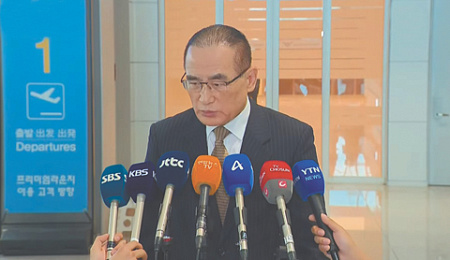
South Korea is in a high-stakes race against an August 1st deadline to avert crippling 25% tariffs imposed by the United States, a move that threatens to strain the relationship between the close allies. With less than two weeks remaining, Seoul is mobilizing its top officials for a frantic diplomatic push in Washington to negotiate a last-minute trade deal.
The urgency of the situation is underscored by the second visit in a month from Wi Sung-rak, the head of South Korea’s National Security Office. His previous trip, which included meetings with U.S. Secretary of State Marco Rubio, failed to produce a concrete agreement on trade or security issues. The lack of progress has intensified pressure on President Lee Jae-myung’s administration to find a breakthrough before the tariffs take effect, potentially inflicting significant damage on an economy for which the U.S. is the second-largest trading partner after China.
These tariffs are a central component of U.S. President Donald Trump’s “America First” policy, rooted in his long-standing criticism of trade imbalances. The measures are part of a broader, ambitious plan to renegotiate dozens of international trade pacts, an initiative that has seen limited success. While temporary 10% tariffs have been in place since April, a July 7th letter from Trump to the South Korean president confirmed the impending 25% hike, warning against any retaliatory measures.
Forced to navigate a delicate balance between its economic interests and its critical security alliance with Washington, Seoul appears ready to make significant concessions. Internal government discussions are reportedly focused on satisfying U.S. demands for expanded access to South Korea’s agricultural market. Washington is pushing for the unrestricted import of American beef, increased purchases of rice, and relaxed rules on apples and genetically modified products, particularly potatoes.
In a clear sign of an all-hands-on-deck approach, a separate delegation from South Korea’s ruling Democratic Party is also heading to the U.S. to support the dialogue. The delegation’s roster, which includes Park Yong-man, the influential former chairman of the Doosan conglomerate, is being kept confidential. Chief trade negotiator Yeo Han-koo has publicly hinted at the likelihood of concessions, stating that “in some areas, we need to make strategic decisions.”
While a compromise appears probable, as Seoul views agricultural concessions as more palatable than the sweeping tariffs, the episode has highlighted a growing need for South Korea to diversify its economic partnerships. For now, officials in Seoul can only hope to secure a deal before the August deadline, all while bracing for the possibility that President Trump might introduce new conditions for his key Asian ally.
